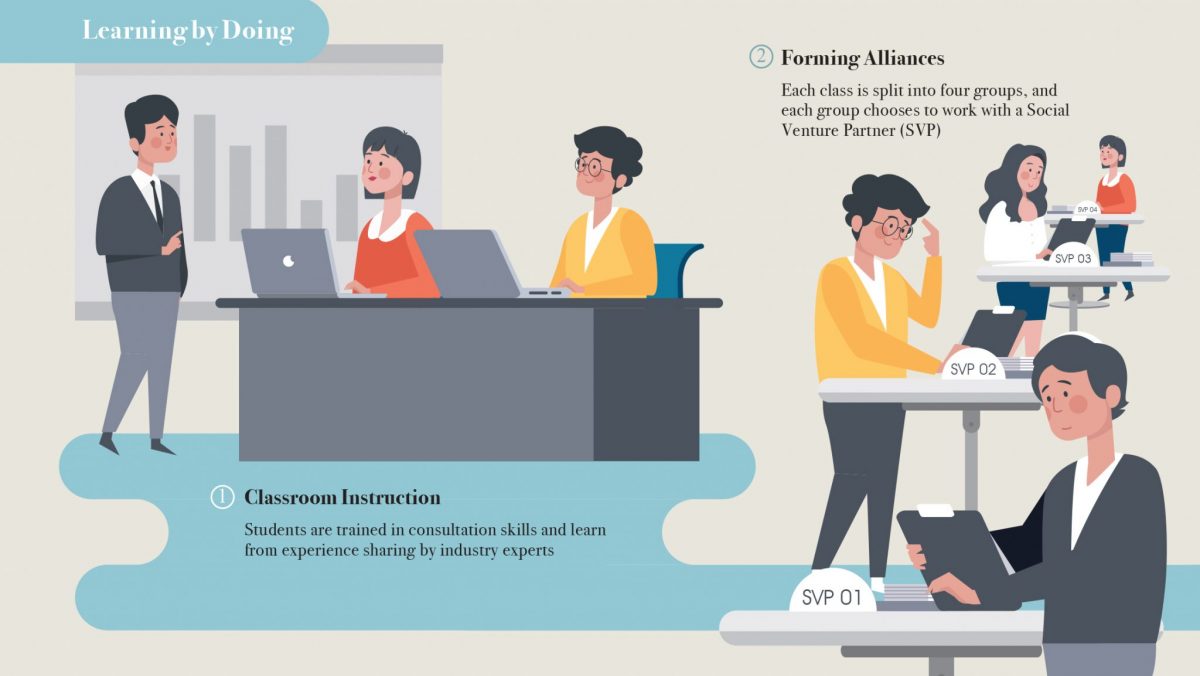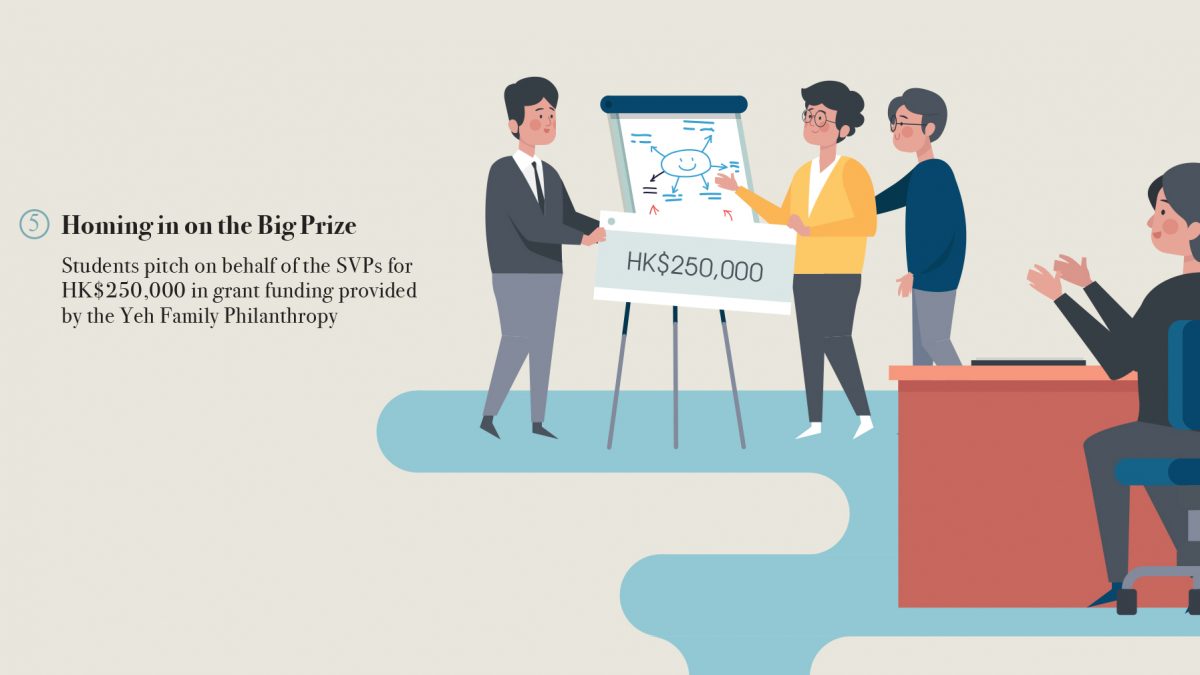Equipping Tomorrow’s Entrepreneurs

To teach entrepreneurship, two campus-wide programmes instil the spirit of innovation in CUHK students across disciplines.
Do entrepreneurs need a college education? Given the stellar startup careers of famous dropouts like Bill Gates, Steve Jobs and Mark Zuckerberg, the answer to this question seems like a no-brainer. But while outliers are given a disproportionate amount of attention, it is easy to overlook the fact that for every Bill Gates, there are countless dropouts who have failed. Plenty of research has shown that higher education is a good way for young entrepreneurs to increase their chances of business success, and that companies started by more educated founders tend to have greater sales volumes.
In recent years, CUHK has been developing new ways to equip the next generation with the skills and resources they need to create their own futures. Entrepreneurial classes impart not only knowledge but also nurture inner ability. The opportunities offered by the many centres, incubators and College programmes enable students to explore their ideas and get a taste of the external business world. An extensive alumni network allows them to receive both advice and capital investment from those who have been there before.
Back when Steve Jobs started Apple in his garage or when Zuckerberg built a dating website in his dorm room, starting one’s own company was much less common than today and the university campus was an unlikely place to find allies and support. Nowadays, with entrepreneurship having become a global phenomenon, universities, the felicitous meeting point of campus resources, expert knowledge and ambitious students, are natural sites for entrepreneurial energy and provide a safe environment for nascent founders to build a network of like-minded people and give their future startups a head start.
Prerequisites to Entrepreneurship

Contrary to popular belief, entrepreneurship can be taught and learned.
– Prof. Andy Wong
Though some of the world’s most successful entrepreneurs have been college dropouts, Prof. Andy Wong, Assistant Dean (Undergraduate Studies) of CUHK Business School and Co-director of the undergraduate minor programme of Entrepreneurship and Innovation (EPIN), argues that a college education has a valuable role in creating better ideas and better entrepreneurs. “Contrary to popular belief, entrepreneurship can be taught and learned. It is not so much about starting a new company as it is about being able to adapt to changes and finding new solutions in all walks of life. A university plays an important role in imparting such essential qualities to the students.”
The first university-wide minor programme in entrepreneurship in Hong Kong, EPIN was launched last September with an ambition to foster a creative culture on campus. The programme is open to undergraduate students from all disciplines and nationalities, and encourages them to mingle and collaborate. Teachers of this programme are no less diverse. They are from the University’s business, engineering, law, psychology, journalism, history and social work disciplines, allowing students across Faculties to find something new to learn.
“There is no such thing as a ‘self-made man’ in the world of startups. Even someone as brilliant as Elon Musk had to partner with people of different backgrounds to come up with PayPal, Tesla and SpaceX,” said Professor Wong. “This programme offers a great opportunity for students to identify their future partners and learn to communicate with people from different fields of expertise.”
Students of the programme are required to complete a minimum of 18 units, or six courses, in three key areas— ‘Mindset and Values’, ‘Knowledge and Skills’, and ‘Practices’.
‘Mindset and Values’ courses develop in the participants an appreciation for creative power and prepare them to be lifelong learners. For instance, the course on design thinking teaches one to think like a designer and combine empathy, ingenuity and rationality to meet user needs and tackle real-world problems.
While it certainly takes some nerve to launch a new business, one also needs a set of critical skills to make it sustainable. In the ‘Knowledge and Skills’ courses, students are free to choose topics of interest or of relevance to their future business, from prototype making to capital-raising, from digital storytelling to copyright and intellectual property. Finally, in the area of ‘Practices’, students integrate the individual components of the programme and turn them into a project ready to be pitched for funding. “Again, it is not a must for every student to become a startup founder, but it is important they internalise what they’ve learned and retain the key messages, which will probably change the trajectory of the rest of their lives,” said Professor Wong.
Nurturing Social Minds
The only way to know what it is like to be a social entrepreneur is to work with one and think like one.
– Prof. Kevin Au
Not all entrepreneurs are driven by personal financial gain. Social entrepreneurs are those who pursue novel business activities that have the potential to solve community-based problems. Riding on the growing interest in this business model, CUHK launched in 2016 a three-credit elective course called ‘Social Entrepreneurship and Impact Investment’. Although it is part of the MBA Programme, the course is open to all postgraduates as well as senior undergraduates to support the emerging generation of social innovators from different backgrounds.
In a typical university course, students only need to worry about writing a good paper or being well prepared for an exam. In this practical course, they must balance academic requirements with the demands imposed by their partner organisations.
Students select their Social Venture Partners (SVPs) in the first week of the course and then in addition to attending weekly classes, work in teams as consultants for the SVPs. They need to come up with ways to improve operations and generate ideas for expansion. The final objective is to help these SVPs pitch their expansion plans to a panel of judges, who will award HK$250,000 to the team with the best plan. “Personal experience is the best teacher. The only way to know what it is really like to be a social entrepreneur is to work with one and think like one,” said Prof. Kevin Au, one of the masterminds behind the course.
As it turns out, the course is a win-win situation for everyone. Students learn first-hand what it takes to be a successful social entrepreneur, while the SVPs benefit from new perspectives and ideas the students bring along. “Some relationships become so well established during the course that students continue to work with their social enterprise partners long after formal instruction has ended,” said Professor Au.
A university prepares students so that they can go out into society and make a difference in the future. The beauty of this course is that they get the opportunity to make a difference right here and right now.
Further Reading:
This article first appeared in Bulletin No. 1, 2018, republished with permission from Information Services Office, The Chinese University of Hong Kong.





